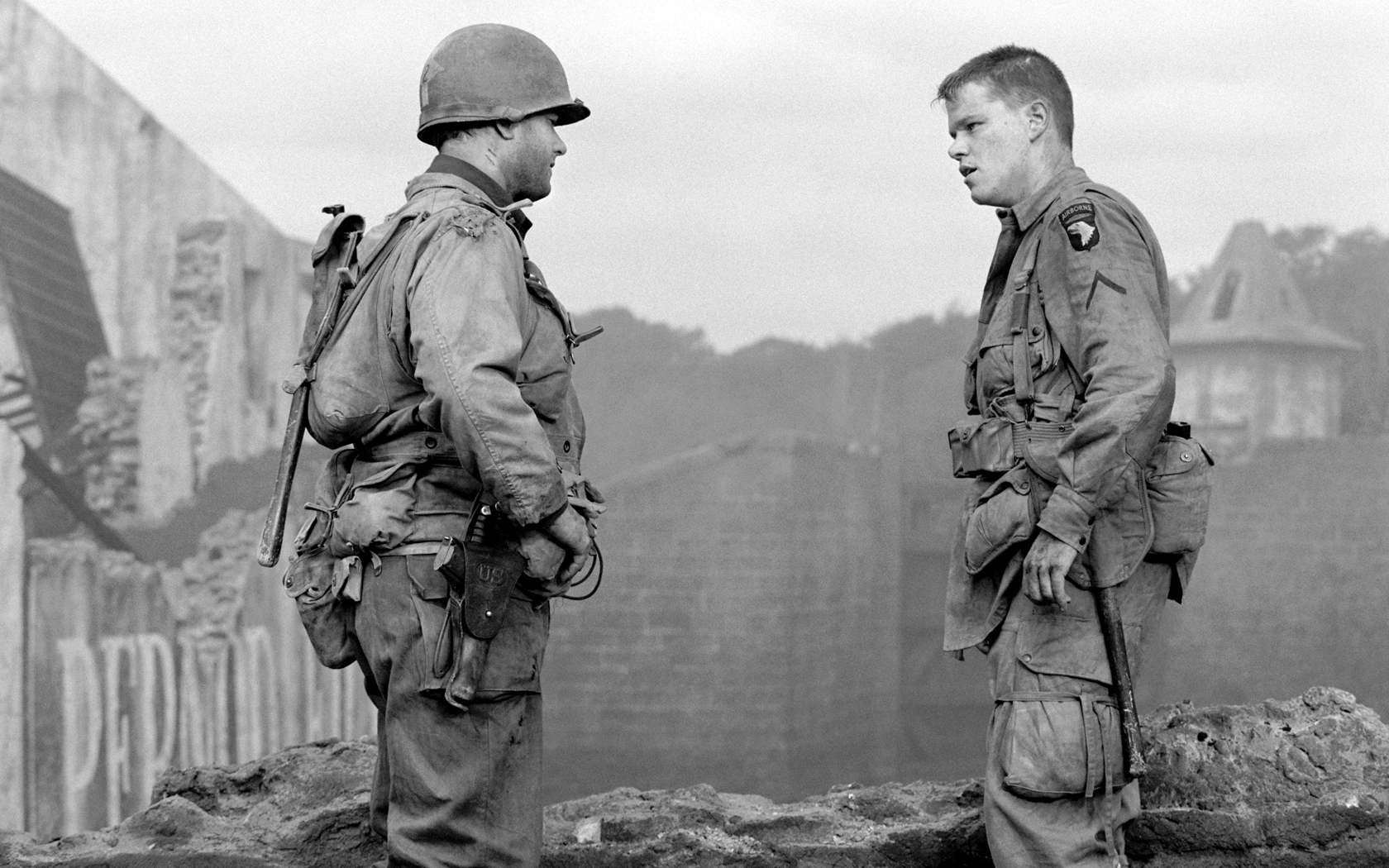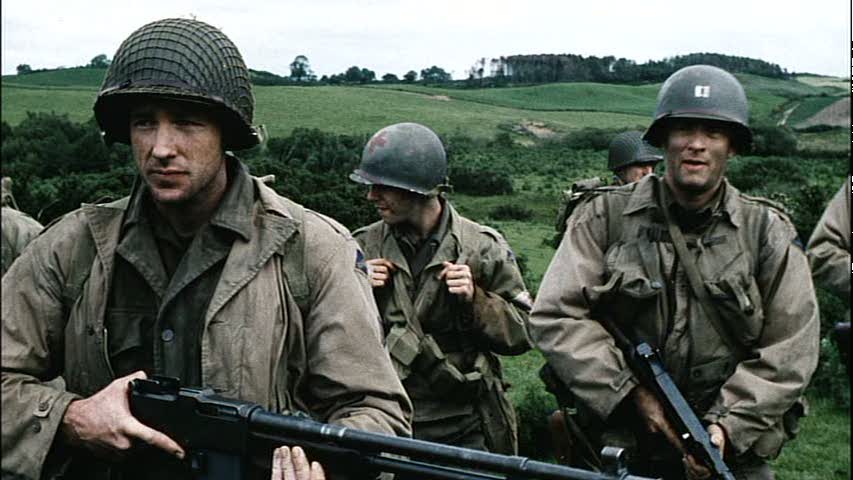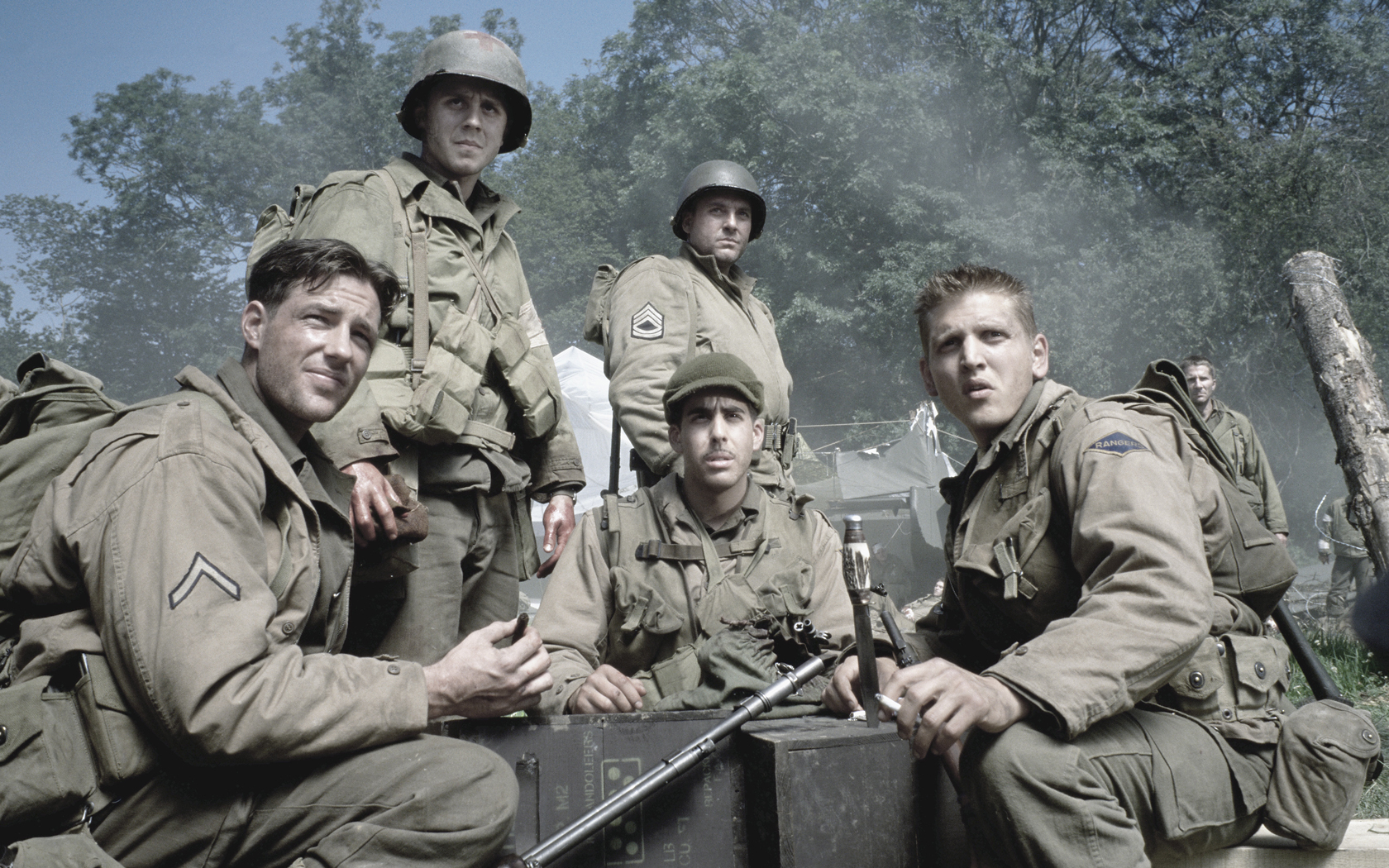Steven Spielberg
has always had a penchant for the grandiose. It is very much on display
in Saving Private Ryan, both in the enormous scope of the project and the scale of violence. At the time of its release, this film was hailed as markedly
graphic. Watching it today, after the last decade of
Tarantino and the desensitization that accompanies that, it's hard to comment, but it is still shocking and unlike films like Braveheart, it
imbues every death with importance, even those of faceless soldiers on the
beaches of Normandy.
Certainly unlike Braveheart, it has enough respect for the enemy to not draw them as one-dimensional Disney villains. They are Nazis, but they are human beings. (It was clear, to me at least, that the one cruel decision made by a Nazi was impersonal and almost accidental, once again driving home the point that in wartime, there is no time to stop and think, to pause and pick out one man in the mayhem.)
Certainly unlike Braveheart, it has enough respect for the enemy to not draw them as one-dimensional Disney villains. They are Nazis, but they are human beings. (It was clear, to me at least, that the one cruel decision made by a Nazi was impersonal and almost accidental, once again driving home the point that in wartime, there is no time to stop and think, to pause and pick out one man in the mayhem.)
This
respect for the individual is the film’s greatest lesson, though loaded with
irony, given the sheer number of on-screen deaths in the first twenty minutes
(1,500 extras were involved). Tom Hanks is somewhere in the mix, but there is
no guarantee of anyone’s survival, A-list or not. This is a world without
heroes, a world where merely being alive on that bloody beach makes one a
target. No one is safe. What does the life of one man
matter in this morally ambiguous cyclone of death, cruelty, and suffering?
Bear
with me a moment, as I go back in history. For centuries, Europe
engaged in wars and rumors of wars using a variety of weapons, but mostly
returning to the trusty sword. There was a sheen of respectability to it
all—despite the ugliness, these men understood glory of combat in a way nearly
impossible for we children of the information age, who have no concept of what
it means to kill, even to eat. They lived cheek by jowl with death, were face to face with mortality, and in some ways, were better for it.
In
1914, the world was ushered into a new mechanized age, where instruments of death
were assembled, pre-packaged, and shipped into battle. But honor lived still,
in the cigarettes and chocolate shared by German, French, and Scots soldiers on
the famous Christmas Eve truce, 1914. (2005 film Joyeux Noel beautifully depicts this story.)
By
1939, even this had passed away with the advent of the impersonal, godless 20th
Century. World War II blasted away all shreds of the Victorian era. It is June
6, 1944 when we step into the peak of this nihilistic warfare, and the allies
are invading France. Thousands of men died.
What
matters the life of one man?
After
the gray terror of Normandy which forms the vast opening sequence in Private Ryan, we return to the efficient sanity of a sunny
government censorship office. A secretary is briskly typing up death reports when the first spark of human mercy steps onto the stage. She notices that
three telegrams are all addressed to the same mother—three of Mrs. Ryan’s four
sons were killed at Normandy. In what may be a rather improbable set of
occurrences, the telegrams make their way to General Marshall, Army Chief of
Staff. And he makes a decision that, probably, no real general would make—to
send a squadron of men behind enemy lines to save the fourth son, eponymous
Private Ryan.
Cut
back to Captain John H. Miller, our protagonist, who earlier led the successful assault on the
beach, and who will now head up the force to save Ryan. He is
charismatic, enigmatic, and disillusioned, watching bleakly as soldiers murder
POWs. But beneath it all, he feels keenly the death of all the last century’s
innocence. “I just know that every man I kill, the farther away from home I
feel.” Hanks’s performance nicely balances the strong, emotionless Miller with
the internal, insecure Miller without indulging in self-pity or impenetrable Clint Eastwood-esque toughness. From the first moments, when he totters, shell-shocked, in the water at D-Day, we can see he is no steely, flippant hero, but an ordinary man. As is reinforced
by the first scene, in which a paunchy grandfather accompanies his twee, uncomprehending
family to an idyllic graveyard, these men were just ordinary guys in
extraordinary circumstances, and we—gawking tourists with cameras—are
unbelievably arrogant to imagine that we understand what it was like.
What
matters the life of one man?
Like most millennials, I find it hard to imagine that the 1940s are any more immediate than the Middle Ages…I have relegated them to the period dramas and that
mysterious era before man stepped on the moon. Films like this remove the
protective veneer of safe, inevitable history—they reach out and touch us.
That, itself, is more than a reason for seeing it (it's not perfect, and not everything happens the way I'd have wished). I truly felt more
respect for veterans after watching this film, which questions them and doesn’t always place them in a good light, than if I had seen blindly patriotic accolades. Miller’s men aren’t
heroes, they’re human.
And
they’re also a lot of fun. There’s the snarky Jew, the tough Italian, leader’s wise sidekick, medic, smart-aleck bad boy, green kid,and bumpkin sniper—but
somehow they fulfill and yet transcend these stereotypes, forming an eclectic,
authentic whole. Quite a few future big names made cameos in the film, including
Paul Giamatti (John Adams), Nathan
Fillion (Castle), and Andrew Scott (Sherlock.)
Needless to say, the company immediately resents the order to send eight men to save one, and the first scene with any significant interaction between them is spent in lively, hilarious griping about the mission. But eventually, we see that the thing which will bind them all together is a desire to return home, to seek for that lost honor in warfare, the glory of the battlefield that they, and the entire world, has left in the dark ages. Like Jim Graham in Spielberg’s underrated 1987 classic Empire of the Sun, or Frank Abagnale in Catch Me If You Can (2002), their story—in particular that of Miller—is essentially one of lost innocence, trying to bring everyone back, to save the young idealistic soldier they all used to be. Todd Alcott correctly points out that the film isn't about saving Private Ryan, it's about saving Captain Miller.
 This
movie is sometimes criticized for jingoism, for painting the Allies as virtuous
liberators, and trumping duty over all consideration for loss of life. In this
day and age, it’s hard to remember a time when Hollywood was friendly or even
provided propaganda for the armed forces, but even so, I would not label it
jingoistic. In the beginning, the men are following orders because that is the
status quo, and they are all part of the dread machine—by the end they are
saving a young man’s life of their own free will, and in the service of
something greater.
This
movie is sometimes criticized for jingoism, for painting the Allies as virtuous
liberators, and trumping duty over all consideration for loss of life. In this
day and age, it’s hard to remember a time when Hollywood was friendly or even
provided propaganda for the armed forces, but even so, I would not label it
jingoistic. In the beginning, the men are following orders because that is the
status quo, and they are all part of the dread machine—by the end they are
saving a young man’s life of their own free will, and in the service of
something greater.
Needless to say, the company immediately resents the order to send eight men to save one, and the first scene with any significant interaction between them is spent in lively, hilarious griping about the mission. But eventually, we see that the thing which will bind them all together is a desire to return home, to seek for that lost honor in warfare, the glory of the battlefield that they, and the entire world, has left in the dark ages. Like Jim Graham in Spielberg’s underrated 1987 classic Empire of the Sun, or Frank Abagnale in Catch Me If You Can (2002), their story—in particular that of Miller—is essentially one of lost innocence, trying to bring everyone back, to save the young idealistic soldier they all used to be. Todd Alcott correctly points out that the film isn't about saving Private Ryan, it's about saving Captain Miller.
Speaking
of which, a young Matt Damon shines here as a principled, self-assured young
man—the perfect contrast to Jeremy Davies’s craven, superior Corporal Upham. He
quickly infuses the character with a genuine likability that slips past his
rescuers’ bitterness and even inspires them. They are, for the first time, a
true team, brothers, enthusiastically engaging in a sort of Swiss
Family Robinson ingenuity to prepare the battlefield for invasion.
 This
movie is sometimes criticized for jingoism, for painting the Allies as virtuous
liberators, and trumping duty over all consideration for loss of life. In this
day and age, it’s hard to remember a time when Hollywood was friendly or even
provided propaganda for the armed forces, but even so, I would not label it
jingoistic. In the beginning, the men are following orders because that is the
status quo, and they are all part of the dread machine—by the end they are
saving a young man’s life of their own free will, and in the service of
something greater.
This
movie is sometimes criticized for jingoism, for painting the Allies as virtuous
liberators, and trumping duty over all consideration for loss of life. In this
day and age, it’s hard to remember a time when Hollywood was friendly or even
provided propaganda for the armed forces, but even so, I would not label it
jingoistic. In the beginning, the men are following orders because that is the
status quo, and they are all part of the dread machine—by the end they are
saving a young man’s life of their own free will, and in the service of
something greater.
They
are not serving from Upham’s arrogant abstractions, but from the real-life,
tangible example of Ryan. This is something better than mere moralizing—it is a
nobility and a brotherhood that has survived the desolation of the 20th Century. Private
Ryan isn't blindly idealistic—his belief in comradeship is rooted in bloody
reality, and the value he places on the life of “the only brothers [he] has
left,” is backed up with action. This is more than the meaninglessness of modern
warfare and the stiff chauvinism of the Victorians.
At
one point in the film, a character, whom we have grown to love, is wounded as
he stumbles into the line of fire. Immediately, the camera cuts away, showing
several other scenes of battle—everyone else keeps fighting. There is no
music. Just another death, just another life. He doesn't matter. Except he
does, doesn't he? He matters to us, and he matters to his friends. He matters
as he's taking his last breath, among the thousands of other dying things on
this broken world.
What
matters the life of one man?
Hannah Long






No comments:
Post a Comment
Warning: blogger sometimes eats comments - make sure you copy your message before you post.